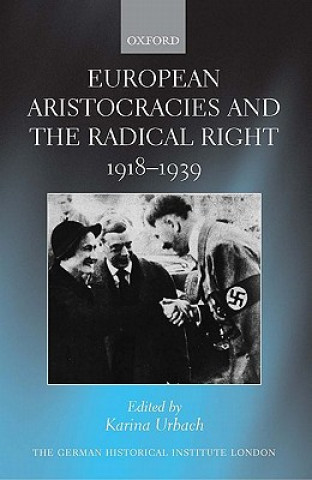
Kód: 04866701
European Aristocracies and the Radical Right, 1918-1939
Autor Karina Urbach
This volume brings together the most recent research on European aristocracies in the first half of the twentieth century. An international array of social and political historians analyses the aristocracies of eleven countries at ... celý popis
- Jazyk:
 Angličtina
Angličtina - Vazba: Pevná
- Počet stran: 256
Nakladatelství: Oxford University Press, 2007
- Více informací o knize

5702 Kč
Dostupnost:
50 % šance Máme informaci, že by titul mohl být dostupný. Na základě vaší objednávky se ho pokusíme do 6 týdnů zajistit.
Máme informaci, že by titul mohl být dostupný. Na základě vaší objednávky se ho pokusíme do 6 týdnů zajistit.Prohledáme celý svět
Mohlo by se vám také líbit
Darujte tuto knihu ještě dnes
- Objednejte knihu a zvolte Zaslat jako dárek.
- Obratem obdržíte darovací poukaz na knihu, který můžete ihned předat obdarovanému.
- Knihu zašleme na adresu obdarovaného, o nic se nestaráte.
Informovat o naskladnění knihy
Zadejte do formuláře e-mailovou adresu a jakmile knihu naskladníme, zašleme vám o tom zprávu. Pohlídáme vše za vás.
Více informací o knize European Aristocracies and the Radical Right, 1918-1939
Nákupem získáte 570 bodů
 Anotace knihy
Anotace knihy
This volume brings together the most recent research on European aristocracies in the first half of the twentieth century. An international array of social and political historians analyses the aristocracies of eleven countries at a particularly testing time: the interwar years. After the First World War aristocrats were confronted with revolutions, republics, and an influx of 'Bolshevist' ideas. Debates about a new order in which aristocrats would play a leading part took place in all countries after 1918. The Mussolini model, in particular, seemed an ideal solution and had an impact on aristocrats all over Europe. Here the exchange of ideas between networks of related aristocratic families played a part in spreading pro-fascist ideas. Anti-Semitism, anti-Bolshevism, and a belief in charismatic leadership also led to admiration of leaders such as Horthy and Franco. In all countries radical right-wing movements tried to recruit aristocrats as symbolic if not strategic figureheads. Is it possible, therefore, to speak of a last flourishing of the aristocracy in countries where fascist or authoritarian regimes were successful? Or are we falling for a left-wing conspiracy theory by overestimating the aristocracy's political prowess and failing to see that they often stood as a conservative bulwark against the radical right? The book shows that if radical right-wing parties could not offer new avenues to power centres, aristocrats, despite a natural predisposition, were not tempted to join, or soon lost interest. Yet their flirtations and short-term entanglements with these movements show that they played a destructive role in the great crisis years of parliamentarism.
 Parametry knihy
Parametry knihy
Zařazení knihy Knihy v angličtině Humanities History Regional & national history
5702 Kč
- Plný název: European Aristocracies and the Radical Right, 1918-1939
- Autor: Karina Urbach
- Jazyk:
 Angličtina
Angličtina - Vazba: Pevná
- Počet stran: 256
- EAN: 9780199231737
- ISBN: 0199231737
- ID: 04866701
- Nakladatelství: Oxford University Press
- Hmotnost: 444 g
- Rozměry: 210 × 143 × 21 mm
- Datum vydání: 01. October 2007
Oblíbené z jiného soudku
-

Hundred Years' War on Palestine
338 Kč -

Ethnic Cleansing of Palestine
358 Kč -

History of Japan
406 Kč -

Ten Myths About Israel
324 Kč -

Strange Death of Europe
410 Kč -

Decline and Fall of the Roman Empire
130 Kč -

Secret History
320 Kč -

God's Playground A History of Poland
1700 Kč -

Mayflower
388 Kč -

How to be a Victorian
303 Kč -

Plantagenets
362 Kč -

General's Son
427 Kč -

Iran: A Very Short Introduction
249 Kč -

Temples of Karnak
3798 Kč -

Cuneiform
276 Kč -

Twenty Years A-Growing
249 Kč -

Bohemian Paris
415 Kč -

History of Witchcraft in England from 1558 to 1718
453 Kč -

China in Africa
894 Kč -

Islandman
249 Kč -

Lancaster And York
490 Kč -

Alexiad
427 Kč -

Modern France: A Very Short Introduction
269 Kč -

Inside Hitler's Greece
522 Kč -

Diana: Her True Story - In Her Own Words
306 Kč -

The Fourth Turning
393 Kč -

The Oxford History of Ancient Egypt
383 Kč -

Churchill: The Power of Words
410 Kč -

Palestine
545 Kč -

Korean History in Maps
709 Kč -

Great Gatsby (Wisehouse Classics Edition)
409 Kč -

Viking Way
1144 Kč -

The Thirteenth Tribe
309 Kč -

My Promised Land
358 Kč -

Vanished Kingdoms
514 Kč -

Age Of Revolution
410 Kč -

Life and Death of Anne Boleyn
584 Kč -

Coming of the Third Reich
464 Kč -

Children of Ash and Elm
464 Kč -

Europe Between the Oceans
798 Kč -

Socialism Betrayed
477 Kč -

303 Squadron
464 Kč -

Ancient Celts, Second Edition
628 Kč -

Dancing in the Glory of Monsters
396 Kč -

Battle of Britain: Luftwaffe Blitz (Images of War)
606 Kč -

Age of Confucian Rule
851 Kč -

Beyond Band of Brothers
410 Kč -

Benjamin Franklin
410 Kč -

On China
462 Kč
Osobní odběr Praha, Brno a 12903 dalších
Copyright ©2008-24 nejlevnejsi-knihy.cz Všechna práva vyhrazenaSoukromíCookies





 Vrácení do měsíce
Vrácení do měsíce 571 999 099 (8-15.30h)
571 999 099 (8-15.30h)